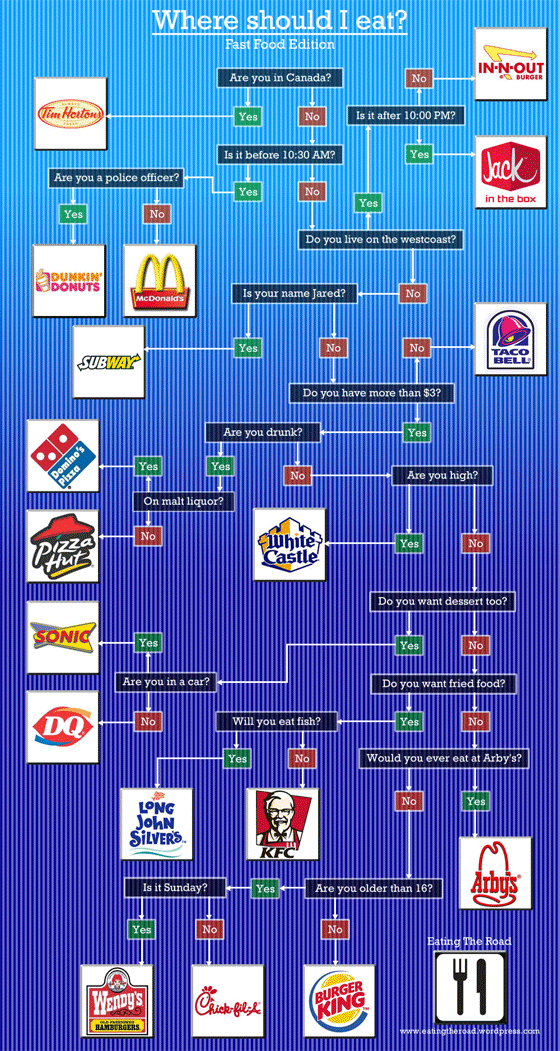
Wednesday, November 18, 2009
Monday, November 2, 2009
How do you view sex?
 The backlash against a pornified view of copulation is now almost as popular as porn itself, raising the question: are we overthinking sex?
The backlash against a pornified view of copulation is now almost as popular as porn itself, raising the question: are we overthinking sex?
The latest to take porn to task for ruining modern fucking is Salon's Mary Elizabeth Williams. She writes,
Convenience, ubiquity, and the goal-oriented, money-shot, male-centric perspective of most porn (hint: women don't need to see that much fellatio) have changed us. Much has been written on how porn's transformation into the modern sexual lingua franca affects women – the pressure to be bush-shaved and adept at pole dancing didn't come from Oprah or Martha Stewart. But porn has changed men too – what we expect of them, what they demand of themselves. And the problem is that thinking you can learn to make to love to a woman from watching porn is like thinking you can learn to drive from watching 'The Fast and the Furious.'
Her point is that dudes who watch too much Ron Jeremy think that women want to be jackhammered — or, more upsettingly, that they enjoy a man "withdrawing his member at key moments to thump it on" them. Williams's piece is pretty funny; about the latter technique, she writes, "You know what description you never want a woman you've slept with to apply to your sexual technique? 'Baffling.'" But do men really need to "learn to make to love to a woman?"
Williams writes that "unlike other recreational pleasures — bowling, baking pies — sex, unless you're a swinger, isn't something people get much firsthand observational experience with," and speculates that some turn to porn for its "instructional uses." She also says, "sex isn't just a matter of doing what comes naturally." To which I thought, it's not? Yes, it's true that your first encounter with your high school boyfriend (or girlfriend) is not going to be the most mind-blowing intercourse of your life. And Williams is right about the necessity of communication: she writes, 'I have nothing but admiration for anyone who's ever had the guts to simply come out and ask a lover what works and what doesn't.' Me too. But the idea that sex is a skill, like bowling, for which we need instructions, actually seems like part of porn culture to me.
To be clear, I don't think Williams is suggesting that guys bone up (sorry) on a million different techniques before bedding women. She seems to be arguing for talking to your partner, not believing everything you see on the Internet, and not taking yourself too seriously — all of which sounds like good advice. What I'm dissatisfied with isn't so much Williams's argument per se as the whole idea that people have to be "good in bed.' It's a concept promulgated not just in porn but in magazines, which imply that you don't really have a good sex life unless you know 32 ways to massage the taint. And in terms of commodifying something that's supposed to be fun and (usually) free, convincing us that we need professional advice on sex is almost as bad as telling us we're not allowed to have pubic hair.
Both sex advice and new sexual techniques can be fun and hot. What's less hot is the idea that sex is just one more area where we have to achieve — and where we're supposed to pay other people money to help us do so. If, as Barbara Ehrenreich alleges, late-stage American capitalism has produced the life coach, it's also spawned a crop of sex coaches — magazine editors and self-help book writers devoted to helping us win the game of satisfying a lover. But unlike capitalism, sex should be a game where everybody wins.
Though Williams, with her emphasis on fun and communication, is part of the solution, her claim that guys can't just do what comes naturally is part of the problem. So, of course, is porn, privileging huge dicks and ridiculous moves over actual enjoyment. But maybe the pornification of sex wouldn't be such a problem if we weren't worried about "doing it right." Maybe we could keep porn in its proper place — entertainment, not instruction or comparison — if we weren't constantly told we needed to compare or instruct ourselves. Maybe what we need is not so much to critique porn, but to get past it — to stop thinking so much and just fuck.
Friday, October 30, 2009
Thursday, October 29, 2009
All the cool kids are doing it.
 Reader Ashi has just alerted us to the existence of this product and asked the question: 'Ummm...What the f*ck?'
Reader Ashi has just alerted us to the existence of this product and asked the question: 'Ummm...What the f*ck?'
Unfortunately, while we do our best to answer your questions, in this case we have to admit: We do not f*cking know.
[Handerpants]
Handerpants: Support Where You Never Knew You Needed It [Gizmodo]
Tuesday, October 27, 2009
Sunday, October 18, 2009
The Culture of the Interrobang

Is the combination question mark and exclamation point a sign of the times?
On Monday I discovered the interrobang, and I have been thinking about it all week. And no, not because I am a grammar nerd, but because I think ‽ may just sum up something about our clever yet confused culture.
The interrobang is a combination of a question mark and an exclamation point. Many of us use this punctuation when we type ?!, but a real interrobang is a merger of these two symbols: ‽
Punctuation expresses an attitude, an idea, and slant. Often we relegate punctuation to the background, deeming it a mere convention or formality. But with each colon, we make a point: one idea explains a previous one. Cause and effect. Sometimes we signal connections between ideas; punctuation can refine relationships between points. Although words can make an impact, punctuation, clauses, and syntax do a lot of work, too.
Punctuation has a history, and we can learn about our past by learning about the lives of punctuation marks. The interrobang is, I think, the only punctuation mark invented in the twentieth century.
Martin K. Speckter is credited with inventing the interrobang in 1962. He was an advertising executive, and needed a better way to express rhetorical questions in his copy. He designed the punctuation, and then solicited suggestions for what to name it. He chose interrobang, which combines the Latin for question (interro-) with a proofreading term for exclamation (bang).
So very Don Draper, circa Mad Men Season 2, no ‽
The interrobang was popular in the 1960s, and Remington added an interrobang key to some typewriters. Then it fell out of favor, and did not rise to the level of a comma, or other standard forms of punctuation.
When my friend said to me, on Monday, “Do you know there is a word for ?!” I was amazed. And smitten by the little fellow (though it took some research to realize a true interrobang superimposes the question mark and exclamation point). I tweeted my new fact, and it was new to many a follower. But then I met with some undergraduates, and to my surprise they had all heard of the interrobang. ‽
Is the interrobang having a revival, I wondered? Why do the young ‘uns know more about obscure punctuation than English professors and bookish types? I learned it is a popular mark in comic books, which are arguably the literary form of our age. Googling about more, I found an interrobang subculture of sorts. Did you know there is a place that sells handbags and accessories on Etsy called “Interrobang: Young, Indie and Grammatically Correct” ‽
It has got me thinking, this punctuation. Might we describe our current cultural zeitgeist as surprise superimposed over curiosity, mixed together with attitude? Is the interrobang a 1960s, type-based version of WTF? A certain informal, witty, knowing, WTF way of approaching the world? Many clever Facebook status updates and comments could be defined, as Wikipedia does the interrobang, as “A sentence ending with an interrobang (1) asks a question in an excited manner, (2) expresses excitement or disbelief in the form of a question, or (3) asks a rhetorical question.”
Could the interrobang be the punctuation mark for our age‽ Guy Debord coined the term “Society of the Spectacle” to describe the late 1960s, and slacker took off to define the 1990s. Might we use the interrobang for ourselves?‽ Aren’t we at once curious and cynical, world-weary yet bemused, and always pretty darned informal?
One of the most talked-about TV shows of the past few years is about advertising executives in the early 1960s. These are the guys who put ‽ on the keyboard. Is the interrobang why we love Mad Men so?
"Thursday, October 15, 2009
Burning bunnies for biofuel?
The Swedes, those latter-day descendants of bloodthirsty Vikings, have found a new use for rabbits: heating fuel. According to Der Spiege l, stray rabbits in Stockholm are being shot, frozen and then shipped to a heating plant to be incinerated. [More]
"Wednesday, October 14, 2009
Americans buy a lot of stupid stuff

Bottle Tops are plastic lids that snap onto aluminum cans. You know, because you're too special needs to drink out of a can without spilling. Jesus, ask your mom for a sippy-cup already. However, if you absolutely must, a 12-pack of different colors will set you back $10."
Saturday, October 10, 2009
imma little teapot, short and STOUT... here is my handle, here is my SPOUT.
Ever since our sunny yellow teakettle bit the dust, it feels like a little cheeriness has been absent from the kitchen. In our search for a new kettle, we've come across a whole spectrum of gorgeous colors. There's something to suit every kitchen, from vibrant teal to retro green. Here are some that have caught our eye...
Read Full Post
Free-Falling Art Of Li Wei
His work is a mixture of performance art and photography that creates illusions of a sometimes dangerous reality. Li Wei states that these images are not computer montages and works with the help of props such as mirror, metal wires, scaffolding and acrobatics.















































































